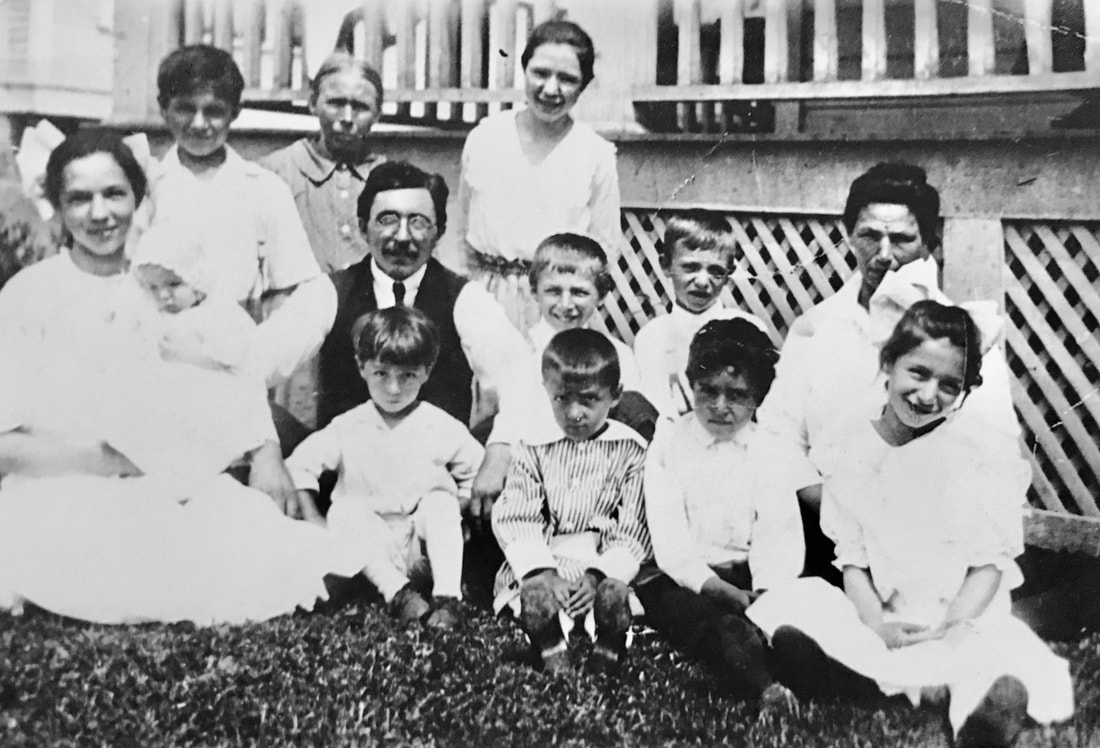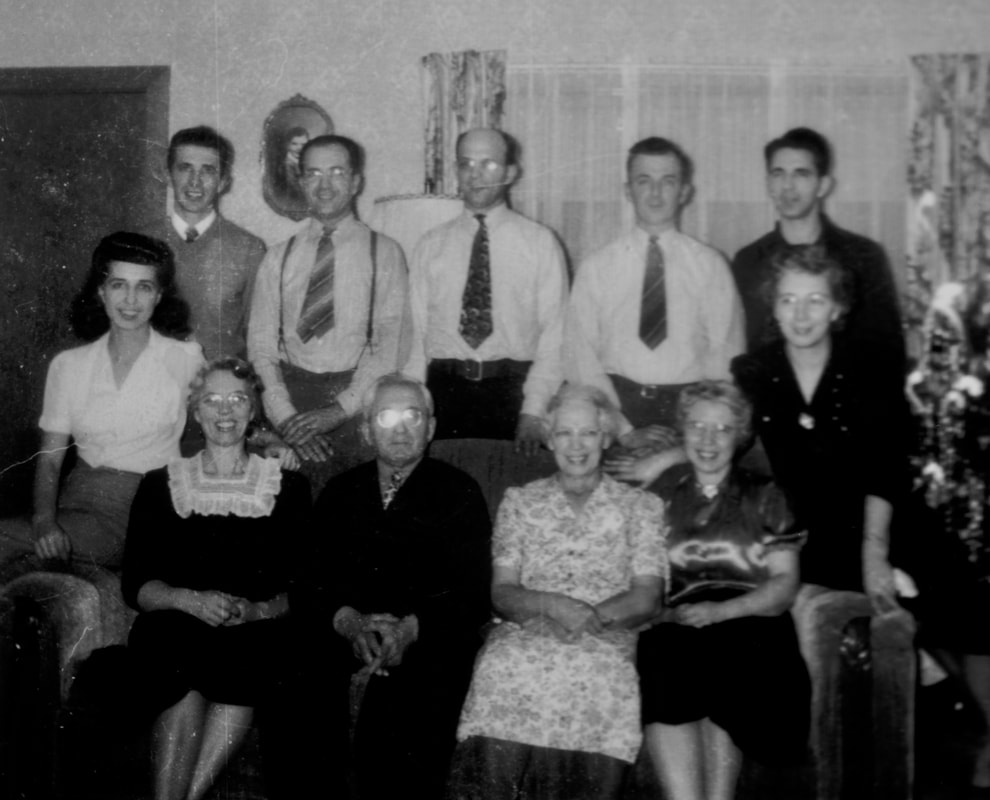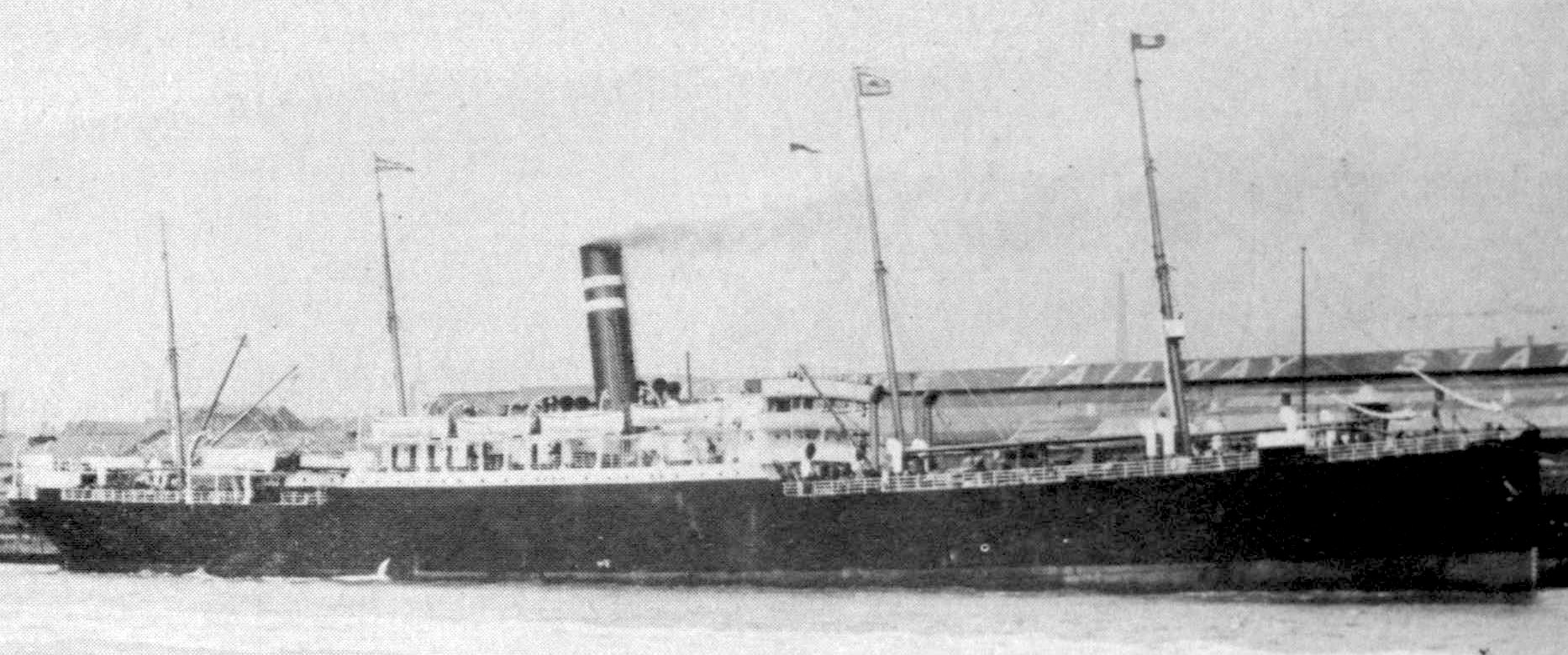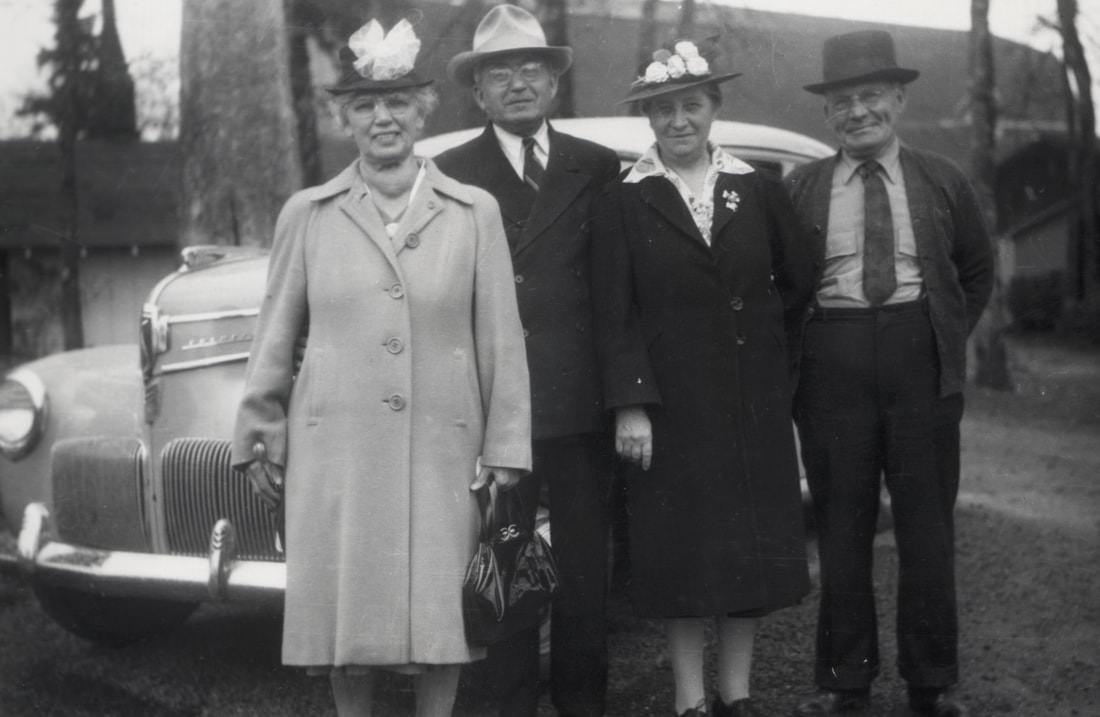People > Our People > Johann Georg and Anna Maria Rück
Johann Georg and Anna Maria Rück
Johann Georg Rück was born on April 26, 1878, in the Volga German daughter colony of Neu-Hussenbach, Samara, Russia, also known as Gaschon. Johann Georg was the son of Georg Peter Rück (born April 24, 1850, in the colony of Merkel, Russia) and Katharina Barbara Keil (born September 13, 1854, in the colony of Anton, Russia).
Johann Georg married Anna Maria Meier (also Maier) on May 29, 1899, in a double wedding with Anna Maria's brother. Anna Maria was born on June 29, 1877, in Neu-Hussenbach, the daughter of Heinrich Jacob Meier (born about 1850 in the colony of Walter, Russia) and Sophia (born about 1850, surname and place of birth in Russia unknown). Their first child, a daughter named Amalia (Mollie), was born on May 17, 1901 in Neu-Hussenbach.
By 1902, Johann Georg and Anna Maria decided to begin a new life in America. Approvals from the village council and a Russian passport were obtained in advance. The parish pastor of Neu-Hussenbach administered their last communion rites on September 9, 1902.
In December 1902, Johann Georg, Anna Maria, and Amalie departed from Neu-Hussenbach with Georg's younger brother, Georg Peter. The family traveled by ship to Saratov and then by train to Libau (now Liepāja, Latvia), where they boarded a steamship to Liverpool, England, on December 12th. After reaching Liverpool, the Rück's departed for America on January 9, 1903, aboard the Canadian Beaver Line steamship Lake Champlain. On January 21, 1903, the Rück's arrived safely in St. John, New Brunswick, Canada. After a short stay in Winnipeg, the Rück's crossed the border by rail and entered the United States on February 10, 1903, at Noyes, Minnesota.
Johann Georg married Anna Maria Meier (also Maier) on May 29, 1899, in a double wedding with Anna Maria's brother. Anna Maria was born on June 29, 1877, in Neu-Hussenbach, the daughter of Heinrich Jacob Meier (born about 1850 in the colony of Walter, Russia) and Sophia (born about 1850, surname and place of birth in Russia unknown). Their first child, a daughter named Amalia (Mollie), was born on May 17, 1901 in Neu-Hussenbach.
By 1902, Johann Georg and Anna Maria decided to begin a new life in America. Approvals from the village council and a Russian passport were obtained in advance. The parish pastor of Neu-Hussenbach administered their last communion rites on September 9, 1902.
In December 1902, Johann Georg, Anna Maria, and Amalie departed from Neu-Hussenbach with Georg's younger brother, Georg Peter. The family traveled by ship to Saratov and then by train to Libau (now Liepāja, Latvia), where they boarded a steamship to Liverpool, England, on December 12th. After reaching Liverpool, the Rück's departed for America on January 9, 1903, aboard the Canadian Beaver Line steamship Lake Champlain. On January 21, 1903, the Rück's arrived safely in St. John, New Brunswick, Canada. After a short stay in Winnipeg, the Rück's crossed the border by rail and entered the United States on February 10, 1903, at Noyes, Minnesota.
The Rück's first settled in the Walla Walla, Washington area, where a second daughter, Katharina Margaretha (Katherine), was born on April 27, 1903. George worked as a laborer, laying railroad ties. In early 1904, Johann George (now George Rick) and an acquaintance from Walla Walla visited Portland. He found a large and growing Volga German community, and jobs were plentiful. Shortly after that, George and Anna Maria decided to relocate the family to Portland.
Georg Peter (now Peter Rick) remained in Walla Walla and married Anna Elizabeth Friese on November 14, 1907. They moved to Yakima in 1922 and operated a fruit ranch. After retiring, they returned to Walla Walla.
After arriving in Portland, George worked at the Eastern & Western Lumber Company for six years. Mill jobs were physically demanding and required long hours of work. George was paid $1.75 for 10 hours of work planning lumber to specific dimensions. The mill was located on the west bank of the Willamette River at the foot of NW 21st Street (now 2500 NW Front Avenue), about 4 miles from where George lived east of Union Avenue (now MLK Blvd.). George walked to work and back to save the 5-cent fare required to ride the streetcars.
George and Anna Maria were blessed with eight more children, all born in Portland: Samuel, born 1905; Carl, born 1906; an infant who died at birth in 1907; Marie, born in 1908; George Jr., born in 1910; John Edward, born in 1912; and Flora Helena, born in 1917.
Georg Peter (now Peter Rick) remained in Walla Walla and married Anna Elizabeth Friese on November 14, 1907. They moved to Yakima in 1922 and operated a fruit ranch. After retiring, they returned to Walla Walla.
After arriving in Portland, George worked at the Eastern & Western Lumber Company for six years. Mill jobs were physically demanding and required long hours of work. George was paid $1.75 for 10 hours of work planning lumber to specific dimensions. The mill was located on the west bank of the Willamette River at the foot of NW 21st Street (now 2500 NW Front Avenue), about 4 miles from where George lived east of Union Avenue (now MLK Blvd.). George walked to work and back to save the 5-cent fare required to ride the streetcars.
George and Anna Maria were blessed with eight more children, all born in Portland: Samuel, born 1905; Carl, born 1906; an infant who died at birth in 1907; Marie, born in 1908; George Jr., born in 1910; John Edward, born in 1912; and Flora Helena, born in 1917.

Photograph of the Rueck family in 1917 at their home on NE 10th Street in Portland, Oregon. Family members identified by George and Anna's daughter Flora: Back row from left to right: Katharine Rueck (née Keil), Mollie. Middle row from left to right: Sam, George, Sr., Carl, cousin Jacob ‘Jack’ Roth, Jr., Anna Marie (née Maier). Front row from left to right: Katherine holding baby sister Flora, Ray, John, George, Jr., Marie. Photograph from the Katherine Rueck Family Albums Collection. Photographer unknown - possibly taken by Jacob ‘Jake’ Roth, Sr. Courtesy of Trina Kay McConnell.
On November 18, 1907, George's father, Georg Peter Sr., departed from the European port of Libau (now Liepāja, Latvia) aboard the steamship Korea, which arrived in New York City on December 9, 1907. After disembarking, Georg Peter Sr. traveled by train directly to Portland, where he reunited with George and his family. George's sister, Maria Magdalena, also arrived in 1907. She married Jacob Roth.
On June 15, 1908, George's mother, Katharina, arrived in New York City aboard the steamship Prince Friedrich Wilhelm, which sailed from Bremen, Germany. Katharina soon joined her family in Portland. Sadly, Georg Peter Sr. died on January 21, 1909. He was buried at the Rose City Cemetery.
By 1910, George had quit his job at the mill and and used his savings to purchase a buttermilk wagon and a horse named "Old Nick". Mollie, Katherine, and Carl helped George with deliveries on Saturdays. George used a scythe to cut hay for "Old Nick" in the new Laurelhurst development (formerly the Hazel Fern Farm owned by the Ladd Estate Company). At the time, the Portland City Directory shows that the Rueck family resided at 549 Failing Street (now 1225 NE Failing Street).
In 1914, the family name was changed from the phonetic spelling of Rick to the correct German to English transliteration of Rück to Rueck, where the "e" is inserted to represent the missing umlaut over the "u."
By 1920, the family had moved to 758 East 10th St. North (now 3530 NE 10th Avenue). George sold his buttermilk wagon in 1913, and, like many of his Volga German countrymen, he started his own garbage hauling business.
The Rueck family were members of the Ebenezer German Congregational Church led by Rev. John Hopp, who lived near them in NE Portland.
By April 9, 1921, George had sold his garbage hauling business. The family moved to the community of Scholls in Washington County, where they acquired a farm on Scholls River Road (now 13140 SW River Road, Hillsboro, Oregon). The Rueck's started with only 3 cows and began to grow wheat, oats, filberts, and walnuts. In the early years, life on the farm was harder than in Portland, and family income dropped sharply. George worried that he had made a mistake selling his garbage-hauling business.
George's mother, Katharina, died in Scholls on December 10, 1921. She was buried at the Rose City Cemetery in Portland.
The farm became successful over time and with much hard work, and the Ruecks continued living at this location for many decades. Farm ownership remains with the family to this day (May 2018).
On June 15, 1908, George's mother, Katharina, arrived in New York City aboard the steamship Prince Friedrich Wilhelm, which sailed from Bremen, Germany. Katharina soon joined her family in Portland. Sadly, Georg Peter Sr. died on January 21, 1909. He was buried at the Rose City Cemetery.
By 1910, George had quit his job at the mill and and used his savings to purchase a buttermilk wagon and a horse named "Old Nick". Mollie, Katherine, and Carl helped George with deliveries on Saturdays. George used a scythe to cut hay for "Old Nick" in the new Laurelhurst development (formerly the Hazel Fern Farm owned by the Ladd Estate Company). At the time, the Portland City Directory shows that the Rueck family resided at 549 Failing Street (now 1225 NE Failing Street).
In 1914, the family name was changed from the phonetic spelling of Rick to the correct German to English transliteration of Rück to Rueck, where the "e" is inserted to represent the missing umlaut over the "u."
By 1920, the family had moved to 758 East 10th St. North (now 3530 NE 10th Avenue). George sold his buttermilk wagon in 1913, and, like many of his Volga German countrymen, he started his own garbage hauling business.
The Rueck family were members of the Ebenezer German Congregational Church led by Rev. John Hopp, who lived near them in NE Portland.
By April 9, 1921, George had sold his garbage hauling business. The family moved to the community of Scholls in Washington County, where they acquired a farm on Scholls River Road (now 13140 SW River Road, Hillsboro, Oregon). The Rueck's started with only 3 cows and began to grow wheat, oats, filberts, and walnuts. In the early years, life on the farm was harder than in Portland, and family income dropped sharply. George worried that he had made a mistake selling his garbage-hauling business.
George's mother, Katharina, died in Scholls on December 10, 1921. She was buried at the Rose City Cemetery in Portland.
The farm became successful over time and with much hard work, and the Ruecks continued living at this location for many decades. Farm ownership remains with the family to this day (May 2018).

Photograph of George and Anna Rueck with their children in Scholls, Oregon about December 25, 1935. Back row standing from left to right: John, George, Jr., Sam, Carl, Ray. Front row seated from left to right: Flora, Katherine, George and Anna, Mollie. Photo on wall: Grandson, Donald Rueck. Photograph from the Katherine Rueck Family Albums Collection.
Photographer unknown. Courtesy of Trina Kay McConnell.
George received heartbreaking letters from family members in Russia during the famine years of the 1920s and 1930s. George supported the Volga Relief Society, which was founded in Portland. Although contact was lost after Stalin ordered the deportation of the entire Volga German population to Siberia and Central Asia in 1941, George eventually reconnected with branches of his family living in Kazakhstan and Siberian Russia.
On May 31, 1959, George and Anna Maria celebrated 60 years of marriage at an open house attended by about 36 family members and 75 friends.
Anna Maria died on April 19, 1962, at the farm in Scholls and was buried at the Finley-Sunset Hills Memorial Park Cemetery.
After a long life, George died on May 26, 1974, and was buried beside Anna Maria.
George and Anna Maria succeeded in their new homeland through calculated risk-taking and hard physical labor. Their foresight gave their children all the advantages of a life in America. Many of the descendants of George and Anna Maria Rueck continue to live in Oregon to this day.
After a long life, George died on May 26, 1974, and was buried beside Anna Maria.
George and Anna Maria succeeded in their new homeland through calculated risk-taking and hard physical labor. Their foresight gave their children all the advantages of a life in America. Many of the descendants of George and Anna Maria Rueck continue to live in Oregon to this day.
Sources
McConnell, Trina Kay, granddaughter of Johann Georg and Anna Maria Rueck.
“Anniversary: Mr. and Mrs. George Rueck Sr., Celebrate 60 Years of Marriage." Hillsboro Argus, Hillsboro, Washington, Oregon, Thursday, June 11, 1959, Volume 66, No. 22 - Section 3.
Woodman, Don. "Volga Exodus Stirs Memory". The Oregonian, Portland, Oregon, September 11, 1941.
"News of the Washington County Farmer". Hillsboro Argus, Hillsboro, Washington, Oregon. Monday, October 9, 1970
Rueck, George. Transcript of an interview with George conducted by Don Neal who was assisted by George's daughter, Katherine Rueck. The interview was recorded in the spring of 1968 at the Rueck farm.
Rueck, Anna Marie. Notes from an interview conducted by her daughter Flora Helena Rueck.
Nakaji, Susan Hopp, Hussenbach and Neu-Hussenbach database.
Krieger, Joanne, trans. Ebenezer Congregational Church, Portland, Oregon 1892-1908. Portland, Oregon: 1999. Print.
Krieger, Joanne, trans. Ebenezer Congregational Church, Portland, Oregon 1909-1984. Portland, Oregon: 2002. Print.
Census lists, city directories, passenger ship records from Ancestry.com
“Anniversary: Mr. and Mrs. George Rueck Sr., Celebrate 60 Years of Marriage." Hillsboro Argus, Hillsboro, Washington, Oregon, Thursday, June 11, 1959, Volume 66, No. 22 - Section 3.
Woodman, Don. "Volga Exodus Stirs Memory". The Oregonian, Portland, Oregon, September 11, 1941.
"News of the Washington County Farmer". Hillsboro Argus, Hillsboro, Washington, Oregon. Monday, October 9, 1970
Rueck, George. Transcript of an interview with George conducted by Don Neal who was assisted by George's daughter, Katherine Rueck. The interview was recorded in the spring of 1968 at the Rueck farm.
Rueck, Anna Marie. Notes from an interview conducted by her daughter Flora Helena Rueck.
Nakaji, Susan Hopp, Hussenbach and Neu-Hussenbach database.
Krieger, Joanne, trans. Ebenezer Congregational Church, Portland, Oregon 1892-1908. Portland, Oregon: 1999. Print.
Krieger, Joanne, trans. Ebenezer Congregational Church, Portland, Oregon 1909-1984. Portland, Oregon: 2002. Print.
Census lists, city directories, passenger ship records from Ancestry.com
Last updated October 27, 2023

